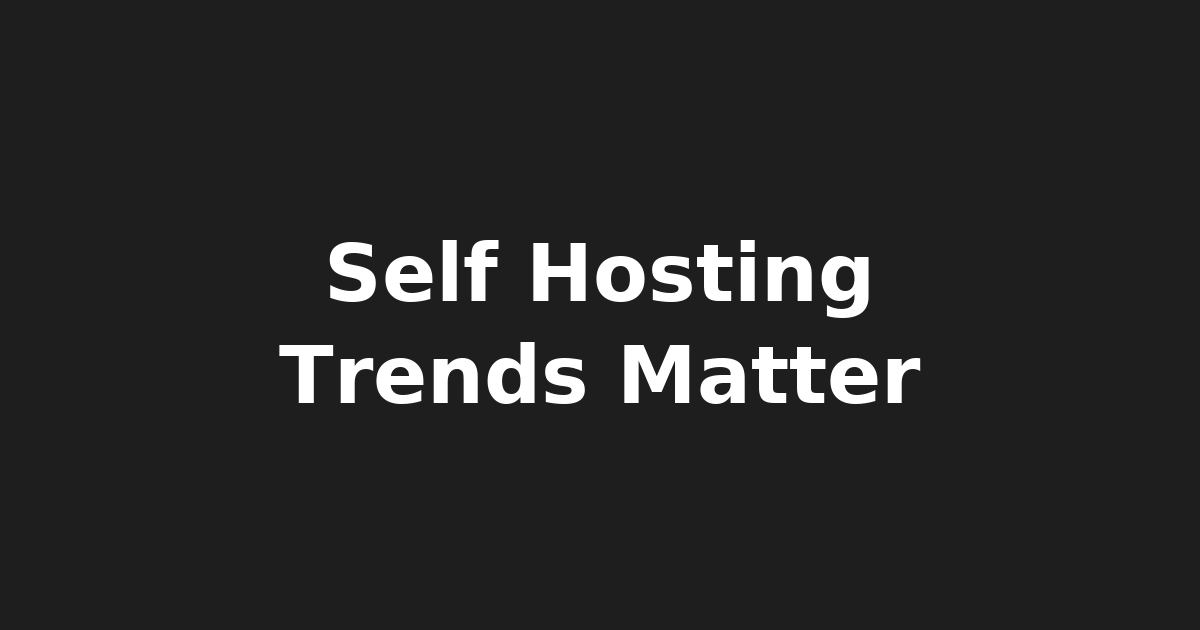7 Key Trends in Self-Hosting for the Modern Developer

Currently Trending Topics in the Self-Hosting Space: 2025 Edition
As the self-hosting space continues to grow in popularity, various tools and technologies have emerged as must-haves for users seeking more control over their digital lives. In this article, we'll explore seven currently trending topics that are revolutionizing the way we approach self-hosting.
Self-Hosted DNS and Domain Management
With the increasing reliance on cloud-based services, many users are now looking to take control of their DNS management and domain registration. Tools like Cloudflare DNS, Nextcloud, and Radicale have gained significant traction among self-hosters.
- Cloudflare DNS: Cloudflare's DNS service offers a free tier with unlimited queries, making it an attractive option for those who want to manage their DNS without breaking the bank.
-
Nextcloud: Nextcloud is not only a popular file hosting platform but also offers advanced DNS management features as part of its suite of tools.
Check out Cloudflare's official documentation for more information on using their DNS service effectively. For detailed Nextcloud configuration, refer to the Nextcloud community forum.
Nextcloud as a Platform
Nextcloud is an open-source, self-hosted platform that allows users to store and manage their data on their own servers. Its popularity has surged in recent years, especially among those looking for a private and secure alternative to cloud storage services.
* **Key Features:**
* File hosting
* Calendar and task management
* Communication tools (mail client, chat interface)
* Media server
* News feed aggregator
Visit the official Nextcloud website for more information on its features and functionalities. For detailed tutorials and setup instructions, see the Nextcloud documentation.
Pi-hole (Home Network Firewall)
Pi-hole is a small, open-source router that can be used as a home network firewall. It's been gaining traction among self-hosters who want to improve their home network security and control their internet traffic.
* **Key Features:**
* Advanced packet filtering
* Ad-blocking capabilities
* DNS leak protection
* Regular security updates
Check out the Pi-hole official documentation for more information on setting up and configuring your Pi-hole. For user testimonials and configuration examples, see the Pi-hole community forum.
Self-Hosted Email with Roundcube
With the rise of email providers like Google Workspace, many users are looking for self-hosted email solutions that offer more control over their data. Roundcube is a popular open-source webmail client that can be used to build a self-hosted email server.
* **Key Features:**
* Advanced email management
* Customizable user interface
* Integration with other Nextcloud features
Visit the Roundcube official documentation for more information on its configuration and setup. For tutorials and best practices, see the Roundcube community forum.
OpenWRT and pfSense as Alternative Router Options
As people become more aware of the security risks associated with traditional routers, there's been an increase in interest in alternative router options like OpenWRT and pfSense. These open-source projects offer customizability, security, and flexibility that traditional routers can't match.
* **OpenWRT:**
* Advanced configuration tools
* Support for various networking protocols
* Regular security updates
Check out the OpenWRT official documentation for more information on its features and setup. For tutorials and guides, see the OpenWRT wiki.
* **pfSense:**
* Advanced firewall configuration
* Support for VPN connections
* Regular security updates
Visit the pfSense official documentation for more information on its features and setup. For tutorials and guides, see the pfSense wiki.
Self-Hosted File Storage with Seafile
Seafile is a self-hosted file storage solution that offers private cloud storage with end-to-end encryption. Its popularity has grown among those who value data privacy and want to take control of their own file storage.
* **Key Features:**
* Private cloud storage
* End-to-end encryption
* File sharing capabilities
Visit the Seafile official website for more information on its features and functionalities. For detailed tutorials and setup instructions, see the Seafile documentation.
Self-Hosted Chat Platforms like Rocket.Chat or Mattermost
With the rise of remote work, many users are looking for self-hosted chat platforms that offer flexibility, customization, and security. Rocket.Chat and Mattermost are popular open-source alternatives to commercial chat services like Slack.
* **Rocket.Chat:**
* Customizable user interface
* Advanced file sharing capabilities
* Integration with other Nextcloud features
Visit the Rocket.Chat official documentation for more information on its configuration and setup. For tutorials and best practices, see the Rocket.Chat community forum.
* **Mattermost:**
* Advanced file sharing capabilities
* Support for integrations with other services
* Regular security updates
Check out the Mattermost official documentation for more information on its features and setup. For tutorials and guides, see the Mattermost wiki.
Conclusion
As the self-hosting space continues to evolve, it's essential to stay up-to-date with the latest trends and technologies. From self-hosted DNS and domain management to advanced file storage solutions, there are many tools available that can help users take control of their digital lives.
By embracing open-source software and customizability, individuals can build a more secure and private online presence. Whether you're looking for a reliable email solution or a flexible chat platform, the options mentioned in this article offer a range of choices for those seeking to self-host their services.
Stay ahead of the curve by exploring these latest trends in self-hosting and discover how they can help you achieve your digital goals.
